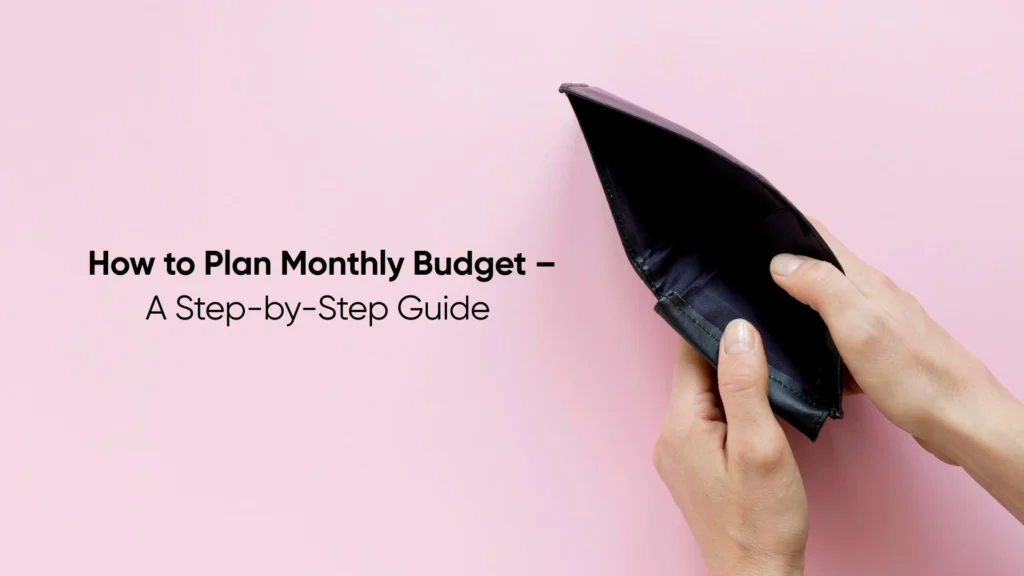How to Plan Monthly Budget – A Step-by-Step Guide

Maintaining a monthly budget is the one financial habit that will help you stay on track with your finances. Setting up a budget makes it easier for you to plan expenses, see where your money is going, and easily reach your financial and personal goals. If only an ordinary earner knew how much money he was spending, saving, and setting aside for emergencies, he could keep his finances in order. You will learn the value of budgeting and how to make a budget plan efficiently to keep everything in balance by following this guide.
Table of Contents
ToggleWhat is a Monthly Budget?
A monthly budget is a financial plan that assists you in providing a transparent view of your earnings and outlays for a specific month. It is a strategy that assists you in allocating your income to different needs by your priorities. Important categories including housing, groceries, entertainment, and savings may fall under this. You may determine if you are overspending or have adequate savings by monitoring your expenditure and comparing it to your budget each month. Learning how to make a budget plan will help you effectively manage your personal loan finances and stay on track with your financial goals.
Why is Budgeting Important?
Budgeting helps as it gives you control over your finances, and makes informed decisions about your spending. The budgeting helps you with:
Savings: Setting aside a certain amount of money each month for your savings account can assist you in keeping a healthy balance for the future. Learning how to make a monthly budget plan ensures you allocate funds effectively for various savings goals.
Avoids Overspending: Creating a budget gives you a road map for how much to save and how much to spend. One advantage of budgeting is that it helps you see how much you are spending, which helps you avoid overspending.
Helps with timely bill payments: A budget helps you to keep aside a certain amount for your monthly EMIs or loan repayments. Budgeting helps you with timely bill payments.
Covering unplanned expenses: Planning your budget helps you to make wise decisions.
Therefore, practicing financial discipline will help you to save money that you may use to pay for unforeseen costs
Also Read: Planning for Unexpected Expenses: Tips & Advice
5 Steps to Make a Monthly Budget
If you are wondering how to make a monthly budget plan, it is a simple and easy step to follow. Here’s a step-by-step guide to help you get started:
1. Gather Details of Your Income and Expenses
Start by having a comprehensive list of all your income sources, such as salary, freelance work, or your investment returns. Then, start by tracking your expenses, which may include your bills, groceries, and entertainment. This method gives a clear picture of your finances and works as a base of your budget
2. Categorize Fixed and Variable Costs
Once you have a list of all your expenses, categorize them into fixed and variable costs.
Fixed costs may include rent, mortgage, and utilities while variable costs include groceries, entertainment, etc. This helps you where your expenses can be compromised to do the relevant spending.
3. Identify Financial Goals
Identify your financial goals that will align with your long-term plans. Whether it’s savings for vacation, or paying off debts, having a specific goal will help you maintain a budget. These goals act as a guide, which will help you prioritize spending and saving efficiently.
4. Allocate Funds
Allocate funds to each category once you have a clear understanding of your income and expenses. You need to make sure your funds should be allocated to the important categories first. This helps to keep your finances organized.
5. Keep Track of Your Spending
Keeping track of your spending is important to maintain a budget. Using tools like spreadsheets, apps or even a notebook can work to keep track of your transactions. This helps you to compare your actual spending with your budget, which helps to identify the spending and adjust whenever necessary.
Also Read: The Dos and Don’ts of Personal Finance Planning
Conclusion
Creating a monthly budget is the best method to reach your financial goals, know your spending, and plan for the future. Sticking to a monthly budget will help you to decide about your expenses, avoid overspending, and save more. Creating a budget and following the process is ongoing and can be adjusted frequently to be successful.
Frequently Asked Questions
What Is The Best Way To Plan A Monthly Budget?
You can plan a monthly budget by listing down all the income sources and expenses. Categorize expenses into fixed and variable, allocate funds, and monitor regularly to adjust accordingly.
How Can I Accurately Track My Expenses?
There are apps available online to maintain and track your expenses. You can also use spreadsheets, or a notebook to maintain and compare all the income and expenses every month and to get an overview.
What Are Some Common Budgeting Mistakes To Avoid?
You should avoid underestimating expenses, failing to save funds for emergencies, and neglecting the changes that need to be made. Regularly reviewing your expenses helps you track and avoid overspending.
How Often Should I Review And Adjust My Budget?
You can keep a balance by regularly assessing your budget and making the necessary adjustments. Thus, it’s advisable to review and make adjustments frequently.
What Tools And Apps Can Help With Budgeting?
Apps like Wallet, Mint, etc help to simplify tracking expenses and categorizing spending. Spreadsheets like Excel or Google Sheets also provide customizable templates for manual budgeting.
How Can I Set Realistic Financial Goals?
Assess your financial situation, set specific, measurable goals, and align them with your budget. Break down goals into short-term and long-term objectives, allowing for flexibility and adjustments.
What Should I Do If My Expenses Exceed My Income?
Cut unwanted expenses, explore additional income sources, and adjust your budget according to it to prioritize your needs.
How Can I Stay Motivated To Stick To My Budget?
Review your budget regularly, and track progress. Use apps and visual charts to understand better. Understand more about the importance and benefits of maintaining a budget.
What Are The Benefits Of Maintaining A Budget?
Budgeting provides financial control, reduces stress, and helps you save for future goals. It ensures you live within your means and empowers informed decision-making for long-term stability.
How Can I Categorize My Expenses Effectively?
Divide expenses into fixed (rent, utilities) and variable (groceries, entertainment) categories. Further, distinguishes between needs and wants, helping you prioritize spending and align it with your goals.
YOU MAY ALSO LIKE

Search by posts
Recent post
-
 Instant ₹10,000 Loan Without Salary Slip – Quick Approval
Instant ₹10,000 Loan Without Salary Slip – Quick Approval
-
 समान मासिक किस्त: आपकी वित्तीय खर्चों को आसान बनाने वाला तरीका
समान मासिक किस्त: आपकी वित्तीय खर्चों को आसान बनाने वाला तरीका
-
 Apply for 50000 Rupees Loan Urgently: Get Disbursed in Few Minutes
Apply for 50000 Rupees Loan Urgently: Get Disbursed in Few Minutes
-
 How to get Instant Loan on Aadhaar Card without Salary Slip
How to get Instant Loan on Aadhaar Card without Salary Slip
-
 How to Apply for a Rs. 25,000 Loan on an Aadhaar Card?
How to Apply for a Rs. 25,000 Loan on an Aadhaar Card?
Categories
- Blog (6)
- Credit History (36)
- Credit Line (7)
- Festive (4)
- Finance (15)
- Mutual Fund (19)
- Personal Loan (276)
- Tax (8)
- Zype (4)













